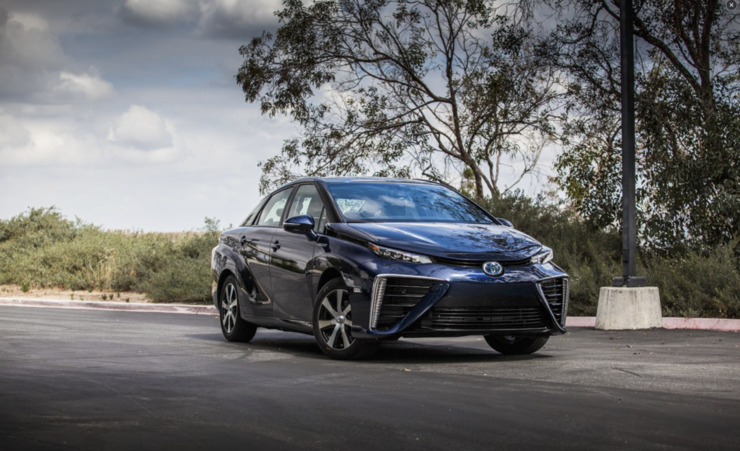| |
 |
|
| ▲ Toyota’s Mirai was released in 2015 but a software defect resulted in the recall of all units in 2017. |
Hydrogen cars, considered a new growth engine for the age of 4th industrial revolution, can currently drive 500 to 600㎞ per charge. In the near future, the motor industry expects upcoming technological advances will extend the mileage of hydrogen cars to 800 to 900㎞ per charge.
Hydrogen cars have a longer mileage per charge than electric vehicles. Although seasonal and locational differences may exist, electric cars can travel around 300 to 500㎞ per charge on average. Hydrogen cars operate with electricity made from the reaction between oxygen in the atmosphere and hydrogen. Because they only emit water and no gases, hydrogen cars are considered a next-generation eco-friendly vehicle.
Most people have a vague idea that hydrogen cars are cars that use hydrogen as fuel, but there are two completely different types of hydrogen car. First is the electric type that uses hydrogen fuel cells to obtain electricity. Second is an internal combustion engine vehicle that moves by burning hydrogen as a gas fuel. To explain the differences between the two types in an extreme way, you could say the first type works in a similar way to an electric car but uses a hydrogen fuel cell instead of a battery. The second type uses hydrogen instead of gasoline or diesel. Between the two, research on fuel cell cars is more active and most of the industry developers are focusing on advancing this method.
The global automobile manufacturers that produce electric hydrogen cars are limited to Hyundai, Toyota, and Honda. Among the three, Hyundai's technology is considered to be one of the best. Hyundai were the first company to mass-produce hydrogen fuel cells in electric vehicles. Though certain circumstances led them to let Toyota's Mirai take the lead at one time, the release of NEXO proved their upper hand once again.
Hyundai Motors have already mass-produced the Tucson ix FCEV, which can drive up to 415㎞ with one charge. In March, they unveiled the NEXO, which takes five minutes to charge and lasts as long as 609㎞.
Currently, they are producing NEXO vehicles at the Ulsan plant. They also have plans to set up a hydrogen bus assembly line at the Jeonju plant that produces buses. Next to its Chungju plant, which focuses on eco-friendly vehicle parts, Hyundai Mobis established a 13,000㎡ hydrogen FCEV parts plant last year and began mass-production early this year.
Japanese automobile manufacturer Honda released their mass-produced hydrogen car, Clarity. Compared to regular fuel cells, the car demonstrated high efficiency, smaller volume, and excellent driving performance. Equipped with an electric motor capable of 177 horsepower and 30.5㎏.m in output, it can go as far as 589㎞ with a single charge. Honda established a partnership corporation with GM to co-produce the fuel cell system.
The world's first mass-produced hydrogen sedan was the Mirai which was developed by Toyota in 2014. It can drive about 502㎞ on one charge. Partnered with BMW, Toyota plans to develop a hydrogen vehicle platform by 2020. Though hydrogen car technology is still in the early stage, experts anticipate the single charge mileage will reach up to 900㎞.
The advantage of hydrogen cars are their high heat efficiency. The current technology that lasts 100㎞ with 1kg of hydrogen has a unit efficiency six times larger than a fossil fuel vehicle of the same level. It also has no gas emissions and the production of hydrogen has low initial costs. It doesn't take long to charge hydrogen cars; the NEXO charges in five minutes. This is much faster than current electric cars.
But, in reality, there are many hurdles to jump before hydrogen cars become truly popular. The biggest of them is the low number of charging stations currently in existence. In Korea, there are only 12 hydrogen charging stations nationwide (From a survey conducted in April 2018, only six of them were usable). The Ministry of Environment vowed to expand this number to 22, but it's still far to few.
To guard against the possibility of explosion, safe distances must be secured. Surveillance systems to secure the safety of users is imperative. They also require professionally trained employees to manage the facilities. Because of these restrictions, hydrogen charging stations are difficult to install in urban areas and highly populated regions. They are also expensive to establishing and operate.
In Korea, LPG and natural gas buses are already widely operated. The infrastructure of charging stations are also put in place. In terms of storing gas fuels in compact, pressurized forms and fueling them to vehicles, charging stations for gas and hydrogen are quite similar.
Some argue that existing gas charging stations can be easily converted into or complemented to double as hydrogen charging stations. If this method is possible, the infrastructure can be quickly established. But this remains a theoretical alternative, as currently, the charging stations are mostly state-owned. It will take a long time to build the infrastructure required by the general public through private operations.
The price of the cars is another issue. According to the industry insiders, if internal combustion vehicles cost 100, then electric cars are 200, and the cost of hydrogen cars is estimated to be 300 to 400. After enough time, when the drawbacks are revised and cost becomes more competitive, they may coexist with the current hybrid or electric cars and increase the market share in the next 30 to 40 years. |




















